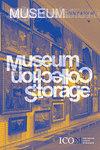Thinking Phygital: A Museological Framework of Predictive Futures
IF 0.4
4区 艺术学
0 ART
引用次数: 5
Abstract
Abstract The Covid-19 pandemic has underpinned the relevance and significance of the strategic use of digital tools for museums as they were unexpectedly obliged to function from behind physically closed doors. Indeed, it is fair to state that museums have come to recognise the relevance and significance of the digital to a far greater degree than they did prior to the pandemic, and museums have also acknowledged an opportunity to experiment and engage with audiences through the strategic use of digital tools. With the return of physical museum audiences (albeit in fits and starts), museums might consider this to mean that digital tools are now less relevant, rather than identifying opportunities to strike a measure of equilibrium between the digital and physical going forward. Acknowledging what has been achieved so far is certainly one point of departure, although it provides only a limited view of the broad range of possibilities that museums might have to choose from in the future. This paper explores the possible spectrum of museum experiences within the remit of the ‘phygital’, and how the physical and the digital can potentially interact to define a museum experience through the lens of museum theory. The possible ‘phygital’ scenarios, ranging from what we will term ‘sustained physical’ to ‘autonomous digital’ shall be identified through the lens of a futures literacy methodology. Such a methodology allows us to rigorously anticipate possible future scenarios and is accompanied by a series of case studies that are also representative of such scenarios. Finally, the paper anticipates possible scenarios for the phygital in terms of museums’ goals, objectives and available resources.思考物理:预测未来的博物馆学框架
2019冠状病毒病(Covid-19)大流行凸显了博物馆战略性使用数字工具的相关性和重要性,因为博物馆出乎意料地不得不在紧闭的大门后运作。事实上,可以公平地说,博物馆比疫情前更认识到数字的相关性和重要性,博物馆也认识到通过战略性地使用数字工具进行实验和与观众互动的机会。随着实体博物馆观众的回归(尽管时断时续),博物馆可能会认为这意味着数字工具现在不那么重要了,而不是寻找机会在数字和实体之间取得平衡。承认到目前为止所取得的成就当然是一个出发点,尽管它只提供了博物馆未来可能不得不选择的广泛可能性的有限视角。本文探讨了在“数字”的范围内博物馆体验的可能范围,以及物理和数字如何通过博物馆理论的镜头潜在地相互作用来定义博物馆体验。可能的“物理”场景,从我们所说的“持续物理”到“自主数字”,应通过未来扫盲方法的视角来确定。这样的方法使我们能够严格地预测可能的未来情景,并伴随着一系列的案例研究,这些案例研究也代表了这些情景。最后,本文从博物馆的目标、目的和可用资源等方面对数字化的可能情景进行了预测。
本文章由计算机程序翻译,如有差异,请以英文原文为准。
求助全文
约1分钟内获得全文
求助全文
来源期刊

MUSEUM INTERNATIONAL
ART-
CiteScore
0.60
自引率
0.00%
发文量
0
期刊介绍:
In its new revised form Museum International is a forum for intellectually rigorous discussion of the ethics and practices of museums and heritage organizations. The journal aims to foster dialogue between research in the social sciences and political decision-making in a changing cultural environment. International in scope and cross-disciplinary in approach Museum International brings social-scientific information and methodology to debates around museums and heritage, and offers recommendations on national and international cultural policies.
 求助内容:
求助内容: 应助结果提醒方式:
应助结果提醒方式:


